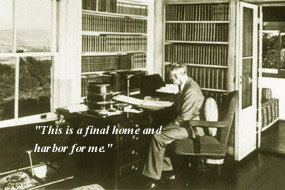|
● Early
Fiction
● Transcendentalists
● Power
of Imagination
● New
Visions of America
● Reform
and Liberation
● Regionalism
● A
New Wave
● Sympathetic
Views
● Rebellious Spirit
● The
Modernists
● The Lost Generation
● Harlem Renaissance
● New
Drama
● Depression,
Realism and Escapism
● Postwar Voices
and the "Beat Generation"
● New American
Voices
New Drama
 There
was another burst of intense literary activity in the 1920s in drama.
Although the premiere
theater town was the large eastern city of New York, most cities
had their own theaters. Professional actors toured the United States,
performing British classics, musical entertainments or second-rate
melodramas.
But there had not yet been an important American dramatist.
Then, in 1916, a company called the Provincetown Players began to
produce the works of Eugene
O'Neill(1888-1953)—plays that were more than just entertainment. There
was another burst of intense literary activity in the 1920s in drama.
Although the premiere
theater town was the large eastern city of New York, most cities
had their own theaters. Professional actors toured the United States,
performing British classics, musical entertainments or second-rate
melodramas.
But there had not yet been an important American dramatist.
Then, in 1916, a company called the Provincetown Players began to
produce the works of Eugene
O'Neill(1888-1953)—plays that were more than just entertainment.
 |
|
O'Neill
|
 O'Neill
borrowed ideas from European playwrights.
Like the Modernists, he used symbolism, adapted
stories from classical mythology
and the Bible, and drew upon the new science of psychology to explore
his characters' inner lives. What made O'Neill unique was his incorporation
of all these elements into a new American voice and dramatic style.
His characters spoke heightened
language—not realistic, yet not flowery.
To express psychological undercurrents,
he had characters speak their thoughts aloud or wear masks, to represent
the difference between public self and private self. He wrote frankly
about sex and family relations, but his greatest theme was the individual's
search for identity. Among his major plays were Desire under
the Elms (1924), Mourning Becomes Electra (1931), The
Iceman Cometh (1946) and Long Day's Journey into Night
(1956). O'Neill won a Nobel Prize in 1936 for literature. O'Neill
borrowed ideas from European playwrights.
Like the Modernists, he used symbolism, adapted
stories from classical mythology
and the Bible, and drew upon the new science of psychology to explore
his characters' inner lives. What made O'Neill unique was his incorporation
of all these elements into a new American voice and dramatic style.
His characters spoke heightened
language—not realistic, yet not flowery.
To express psychological undercurrents,
he had characters speak their thoughts aloud or wear masks, to represent
the difference between public self and private self. He wrote frankly
about sex and family relations, but his greatest theme was the individual's
search for identity. Among his major plays were Desire under
the Elms (1924), Mourning Becomes Electra (1931), The
Iceman Cometh (1946) and Long Day's Journey into Night
(1956). O'Neill won a Nobel Prize in 1936 for literature.
Previous Page Next
Page
|

